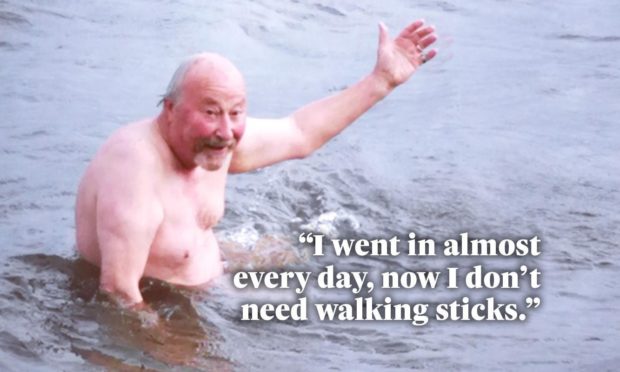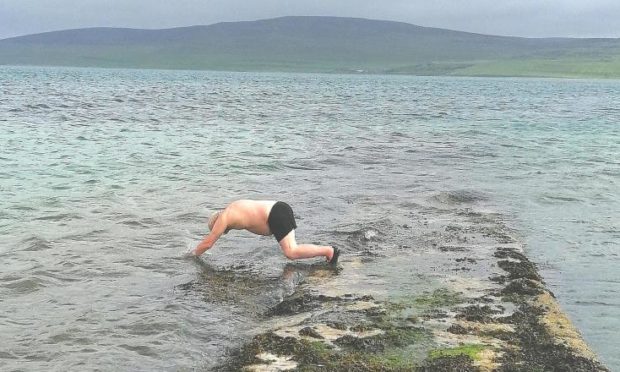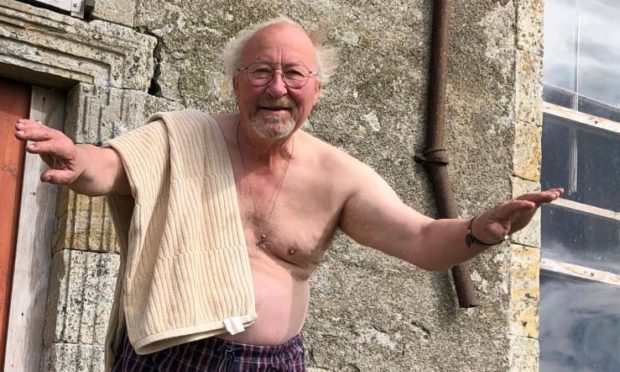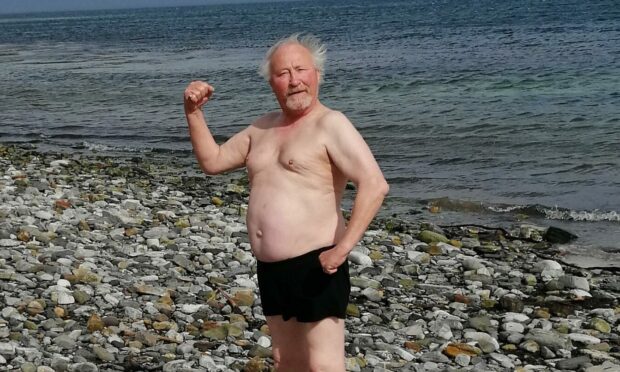The benefits of wild swimming have been two-fold for Andrew Appleby.
The adventurous 73-year-old took the plunge to raise money for a historical society.
But he also believes the invigorating sea swims have rid him of arthritis, diabetes and high blood pressure.
Mr Appleby is president of the John Rae Society, set up to promote the achievements of the 19th century Arctic explorer.
It plans a £4 million restoration project to establish an international arctic centre at the Hall of Clestrain in Orkney, Rae’s birthplace.
Open sea fundraising challenge
As part of fundraising efforts, supporters were asked to take on a series of challenges.
Mr Appleby decided to swim one stroke in the sea for each of the 3,645 miles Rae walked during his Arctic explorations.
Wearing just trunks and no wetsuit, he completed the first leg of a three-part challenge in October.
He then undertook to swim a stroke for each of the 6,700 miles Rae sailed in small boats during his expeditions.
Having started during the winter, a back injury – followed by a broken rib – forced him to delay his swimming until April.
Overcoming freezing conditions, rough seas and jellyfish, he recently completed the task, swimming up to 1,111 strokes a day.
His efforts have so far raised more than £6,000. But the improvements in his health appear to have been even more spectacular.
Mr Appleby said: “I’ve found that the health benefits of the swim have been amazing. I had arthritis in both knees and they were going to give me two new kneecaps.
“I went swimming in Westray one February some years ago when the snow was horizontal. I was using two walking sticks at the time.
‘The arthritis had cleared up’
“I got really cold and went blue. But suddenly I began to warm up as circulation kicked in. The next day I barely needed one stick and so then went in pretty much every day in winter.
“I came out feeling so much better. The other knee cleared up and I did not need the sticks again. I later went for an x-ray which showed the arthritis had cleared up.”
Mr Appleby said since he has been swimming regularly his high blood pressure has returned to normal, while his diabetes has “disappeared”.
“I think it’s the sea swimming that’s doing it. It does a lot of good.”
For his next challenge, he plans to swim 1,700 strokes to raise further funds for an archaeological dig at Hall of Clestrain.
“I’ll certainly continue to swim. When I first took on the challenge people said ‘you’ll kill yourself’. Well, I haven’t done that yet. In fact I think I’ll live a much longer life now.”
Alan McGinley, of Scotland Versus Arthritis, said: “Almost one-third – over 1.5 million – of the Scottish population live with a musculoskeletal condition such as rheumatoid arthritis, osteoarthritis and back pain.
“It was wonderful to hear about Andrew’s story and how exercise like swimming has had such a beneficial impact.
“Swimming can be an incredibly good choice of exercise if you have arthritis because it stimulates blood circulation, reduces muscle stiffness and eases pain.
“Importantly the water can reduce the impact on joints as well as helping them be more flexible. The benefits of a cold water dip have often been spoken about over the centuries, but more studies are needed to examine its anti-inflammatory and health potential.
“Whilst swimming in general can be beneficial, cold water swimming can be dangerous if you are not used to it, and what may work for one person may not work for another.
“When considering any exercise or treatment we recommend that you always check first with your local healthcare team or GP to find out what might be suitable for you.”
Award-winning writer Daniel Start, author of Wild Swimming, said of Mr Appleby linking his health benefits to sea swimming: “I can quite believe this. Wild swimming seems to be able to provide a complete immunological reset, based on the regular release of endorphins, together with the associated fitness and wellbeing effects.”
He said there are a few different physiological and health effects.
“First, a one off dunk creates intense vasodilation, pumping out muscle lactates, and bringing fresh blood to the extremities.
Wild swimming has surged in popularity
“Second, a cold dip also provides a psychological kick-start. A powerful endorphin shot is released and this natural high bringing on intense feelings of well-being and an addictive urge to dive back in.
“Third, after regular swimming, a process known as cold adaptation kicks in. Not only does this reduce your body’s sensation of coldness (making even the coldest water quite pleasant), it is clinically proven to boost mode, libido and the immune system.”
Cold water swimming has enjoyed a huge surge in popularity in recent years, with many parts of Scotland having clean waters to take a dip.
However, medical research appears to be inconclusive on its benefits, with warnings it can still pose a health risk for the inexperienced.
One report ‘Cold water immersion: kill or cure?’ said its use as a treatment for inflammation-related conditions or to boost the immune system have still to be explained fully.
It said the impact can vary from beneficial to detrimental depending on a number of factors, including the duration and intensity of cold water exposure.




